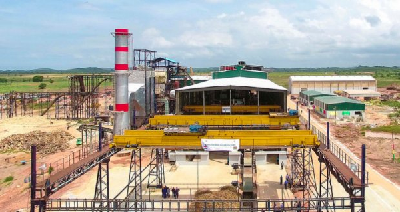
Politics over Komenda Sugar Factory is needless
One controversial issue that keeps emerging from time to time is the readiness of the sugar factory at Komenda to begin operations in response to self-sufficiency in sugar production and also in line with the interest of desperate jobseekers in and around Komenda area in the Central Region.
While the factory was expected to generate energy for its production activities and be able to supply by-products such as molasses for the alcohol industries, the numerous challenges facing the factory have led to its closure a few weeks after the inauguration by former President John Mahama.
Advertisement
The challenges include unreliable supply of sugarcane for continuous processing after the preliminary test run, thereby stifling the operations of the company.
In view of what is happening, is there a need for any politics of blame game? Again, was the factory really ready to be fully operational before its inauguration?
A careful analysis of the situation shows that the factory was not ready for operation before its inauguration.
This is because the raw material base for the factory was not properly catered for.
For example, a factory of that nature needed adequate land preparation and cultivation but it looks as if this was not done.
Furthermore, arrangements were not put in place for an effective agronomy in the area as far as sugarcane cultivation and processing were concerned.
Field crop cultivation and soil management would have dealt with pests and disease control to ensure good yields in raw material production.
Another observation is that irrigation systems for the area were not properly handled before the inauguration of the factory.
All these should have been well thought through to cater for the harvesting of sugarcane to feed the factory on continuous basis.
In addition to all these, other relevant factors such as transportation systems, tractors and other needed machinery should have been catered for to make the factory practically ready for operations.
What is more, serious sugarcane plantation programme was not put in place to support the raw material base.
As a result of all these shortcomings, the general raw material requirement, as a crucial element for the smooth operation of the factory, was absent.
And in the absence of this, it is difficult for the Komenda sugar factory to become operational.
Again, an important factory of that dimension should have put in place other relevant systems for successful, smooth technical, financial and administrative operations of the factory.
Systems that should have been put in place include finance/accounts department, as well as other departments for human resource production and stocks.
The status of the factory before its inauguration shows that it was not ready to be fully operational.
In the light of all this, the politics of blame game between the former political administrators of the country and the current one ought to be pushed aside for all of us to concentrate on addressing the problems associated with the factory in order to make it fully and meaningfully operational in the interest of our national needs.
Such an approach is what is needed for the development and implementation of a plantation and out-grower scheme as a sure way of providing the needed raw materials for the factory.
Interestingly, a group of researchers from the University of Cape Coast (UCC) have come to the conclusion that the Komenda Sugar Factory is not likely to become operational anytime soon.
This group led by its principal investigator, Dr David Oscar Yawson, stated in February this year that the factory needed close to 300,000 metric tonnes of sugarcane to become fully operational.
What this means is that we are nowhere near the point where we could make it possible for the factory to become operational.
It has been reported that the Minister of Trade and Industry, Mr Alan Kyeremanten, told Parliament just before the close of last year that a $24.5 million Indian Exim Bank credit facility was being secured to help the factory to become operational.
While this is good the government, it is respectfully suggested, should wash off its hands and collaborate with private investors to take over the factory.
The government should concern itself with good governance and the creation of the right atmosphere for investors to cash in and operate their businesses.
It should not be tempted to be involved in the running of any business in the country but rather collaborate with the private sector for that purpose.
Director of Corporate Communication, Ghana Standards Authority




